#ocean biodiversity
Explore tagged Tumblr posts
Link
not sure about the reason yet.
(source: bbc news | 4 dec 2022)
19 notes
·
View notes
Text
I love butterfly rays because half of the images of them online come in two varieties and it’s

a) a baybey!
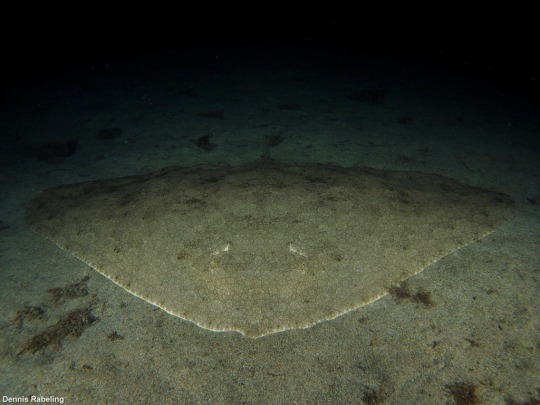
b) I know what you are.
#been sitting in my drafts forever#marine biology#marine bio#biology#science#marine biology memes#ray#butterfly ray#chondrichthyes#cartilaginous fish#creatures#sea creatures#cryptid#marine biodiversity#marine bio meme#meme#science meme#bio#ocean lover#ocean#thalassaphobia#thalassaphobia cw#post#also ty guys for 170+ followers!! :.)
92K notes
·
View notes
Text
#ProtectTheOceans #BeneathTheSurfaceLiesTheFuture "Octopus Odyssey expedition is currently underway in the Pacific Ocean, off the coast of Costa Rica, with the objective of investigating underwater mountains that scientists believe harbor distinctive habitats and biodiversity." Schmidt Ocean Institute
youtube
#Schmidt Ocean Institute#Protect The Oceans#Beneath The Surface Lies The Future#Ocean biodiversity#Youtube
0 notes
Text
Endangered Species Sightings from This Year
This is thought to be the first time in over 20 years that a blue whale was spotted off the Coast of Massachusetts.
I highly recommend watching the video and listening to the reaction of the people on the whale watching boat--the cheers and emotion in some of their voices, especially the woman saying "I'm trying not to" when someone jokingly tells her not to cry.
This is the first time ever that a mother clouded leopard with two cubs has been spotted on a game cam!
"After being considered regionally extinct for over a century, giant anteaters have been spotted roaming once again in Brazil's Rio Grande do Sul state. Scientists have concluded these returned natives ventured over from Argentina's Ibera Park, where conservationists have released around 110 rescued and captive-bred anteaters since 2007."
Over 100 years and the anteaters are finally coming home!
#conservation#animal conservation#biodiversity#good news#environment#whale conservation#wolverine conservation#anteater conservation#rainforest conservation#ocean conservation#hope#optimism#radical optimism#positivity#ecoanxiety#climate anxiety#cat conservation#clouded leopard conservation#zoos prevent extinction
2K notes
·
View notes
Text

The kelp is blooming
#art#digital art#artists on tumblr#digital drawing#nature#sea#ocean#fish#kelp#nautical#marine biodiversity#illustration#marine life
4K notes
·
View notes
Photo

Hyperrealistic Marine Life Portraits Highlight the Ocean’s Incredible Biodiversity
There is an abundance of life underwater that we rarely have a chance to see and appreciate. That is why Portland, Maine-based artist Zoe Keller is giving these diverse creatures a stage in her series titled Ocean Biodiversity. From octopus to starfish to jellyfish, the breadth of marine life is captured in her detailed digital depictions.



#zoe keller#artist#art#hyperrealistic marine life portraits#portraits#underwater#portland maine based artist#ocean biodiversity#digital
0 notes
Text

The noggin of a hammerhead shark does more than just enhance its good looks. This shark’s uniquely-shaped head improves its sense of smell as well as electroreception! Widely spaced nostrils, and greatly enlarged scent organs on its snout, enable it to detect the direction a scent is coming from. And wide-set eyes provide excellent 3D vision. Fun fact: of the some 400 shark species known to science, only 9 are hammerheads.
Photo: Mark Chivers, CC BY-NC-ND 2.0, flickr
#science#nature#natural history#animals#sharks#did you know#fact of the day#hammerhead shark#hammerhead#ocean life#marine biology#marine biodiversity#sea creatures
797 notes
·
View notes
Text

This is a metal snail (Volcano Snail) that lives on underwater volcano vents in the Indian Ocean. Its shell and scaly feet both are armoured with layers of iron, making it the only animal to incorporate iron sulfide into its skeleton 🐌
📷: Dr Chong Chen/IUCN
#snails#snail life#snail#iron snail#oceans#indian ocean#science#news#research#biodiversity#iucn#iucn red list#science acumen#wildlife biologist#marine biology#biology#volcano#active volcano#amazing
4K notes
·
View notes
Note
Got facts about pyjama sharks? They are very cute :)

Pyjama shark or striped catshark (Poroderma africanum).
You're 100% right, they're absolutely adorable. These little guys only grow to be approximately 1.1 m (3.6 ft) long. These sharks are primarily nocturnal and hunt small fish, crustaceans, and shark egg cases. They capture prey the same way that crocodiles do! They'll bite onto their prey and roll to disorient and kill it.

These sharks are endemic to the waters of the South Africa coast (aka, that's the only place they're found in the wild). The biggest threat to their population is being caught as bycatch. The good news is that their populations are believed to be increasing and their conservation status is that of least concern!
#marine biology#science#biology#animals#marine ecology#fish#Shark#sharks#pyjama shark#striped catshark#ocean#oceans#sea#sea life#sea creatures#ocean life#ocean animals#sea animals#earth#biodiversity#fun fact#fun facts#animal facts#cool facts#zoology#cute animals#cute animal
353 notes
·
View notes
Text
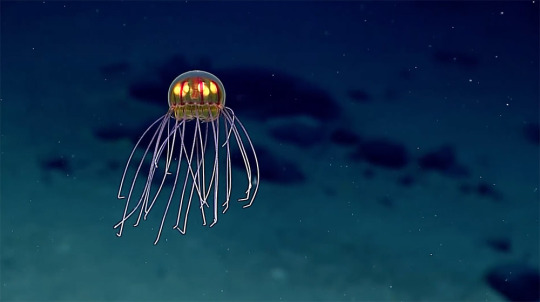
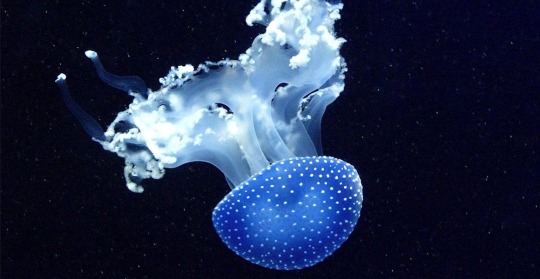
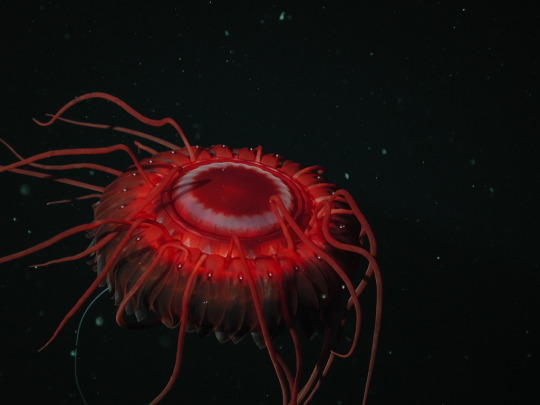

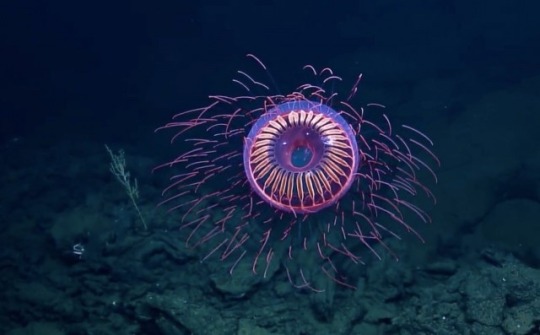




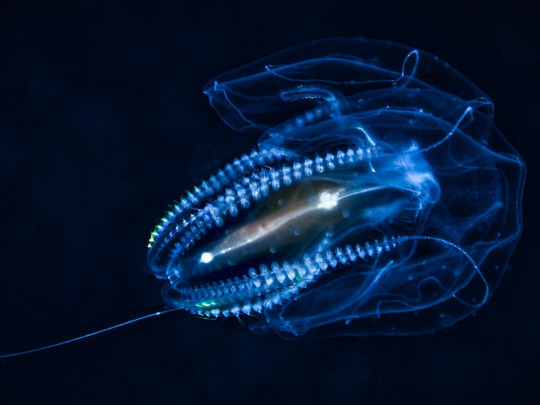
A group of jellyfish is called a SMACK
#cnidarians#marine biology#marine life#marine science#fish#marine biodiversity#jellyfish#underwater#sea life#sea critters#sea animals#marine animals#deep sea#love to sea it#there are many benefits to being a marine biologist#bioluminescence#aquatic life#ocean#sea#ocean animals#creatures#Cnidaria#last one is a ctenophore#sea creatures#marine creatures#creature feature#hydrozoa#ocean life#ocean creatures#source: google
3K notes
·
View notes
Text
[Warning: Graphic (some very graphic) shark-fishing pictures at the link.]
"Suhardi isn’t your average snorkeling guide. Born on the Indonesian island of Lombok, he’s spent his life on water. While he now seeks out sharks for the enjoyment of tourists, he once hunted sharks to help earn money to feed his family and educate his two children.
Suhardi was a fisherman for more than 20 years. He first started fishing working on his parents’ boat, but was then asked to join the crew of a shark boat where he was told he could earn a lot of money. Back on deck, he looks embarrassed to divulge what a meager wage it was, but finally confesses he earned around $50 for up to a month at sea.
Now he and 12 other former shark fishermen are part of The Dorsal Effect, an ecotourism company that helps ex-shark hunters find a new vocation. Each week, the team takes groups of tourists, schoolchildren and university students to off-the-grid locations and guides them around pristine reefs. Each trip is designed to take guests on an exploratory journey of both the shark trade and marine conservation through the eyes of the Sasak people of Lombok.
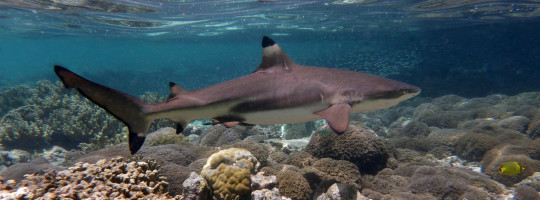
Lombok is a hotspot for marine diversity, sitting just east of the Wallace Line, a biogeographical boundary separating Asia and Australia and their respective fauna. Pristine coral gardens and around 80 species of sharks can be found in its waters. The island is also part of the world’s largest shark-fishing nation. Only the whale shark (Rhincondon typus) is protected in Indonesia; all other sharks can be legally caught.
The Dorsal Effect first launched in 2013, a year after Suhardi met Singaporean ecologist Kathy Xu, who had traveled to Lombok to find out more about the shark trade. The diminutive but quietly determined Xu wanted to protect sharks, but because she knew shark fishing was poorly paid and dangerous, she wanted to hear the fishermen’s stories too. They told her how once they could fish for sharks close to shore, but now with the shark population dropping, the fishermen said they needed to travel farther out to sea, only to come home with a relatively poor catch. The reduced catch also meant reduced pay, so they often couldn’t cover their costs...
Yet, when Xu asked why fishers didn’t seek out another trade, she learned they didn’t want to be separated from the sea. They saw it as part of their heritage.
But as they spoke longer, the shark fishermen talked about the coral gardens that could be found under the waves, ones that only they knew about. Inspired by a whale shark diving trip she’d taken with scientists on the Great Barrier Reef, Xu had an idea. “If such spots exist,” she recalls telling the fishers, “I could take tourists out with you and pay you more than you earned shark fishing”.
At first, Xu guided the former shark fishermen on how to become eco-friendly tour operators. They dropped anchor away from the reef, served guests plant-based dishes, and made sure all trash was taken back to shore. But then Xu saw that something special was happening: The former fishermen had started to take the guest experience into their own hands, making sure tourists felt at home. Suhardi painted “Welcome” in large letters over the front of his boat, fitted green baize to the top deck for outdoor seating, and hung curtains in the cabin so his guests could enjoy some shade.
Suhardi has already bought a new boat with his earnings from snorkeling trips. “Every day is my best day,” laughs Suhardi, whose smile always travels from his mouth to his eyes.
While they were receiving tourists from across the globe, there was another group that Xu wanted to reach out to. “I think it was the teacher in me who felt impassioned about influencing the young,” she says. She reached out to schools and created a five-day program that would help students understand the shark trade and local conservation efforts. During the program, paid for by the school and students, participants would not only meet the ex-shark fishermen so they could ask them about their lives, but also hear from NGOs such as the Wildlife Conservation Society about their efforts to slow the trade. The Dorsal Effect also hired marine biologists to host nightly lectures and help the students with their field surveys...
The students were faced with the realities of the fishing trade, but they were also encouraged to take a balanced view by The Dorsal Effect team. The villagers weren’t just taking the fins, and throwing away the rest of the shark; they processed every piece of the animal. While they did sell the meat and fins to buyers at the market, they also sold the teeth to jewelers, and the remains for pet food.
The Dorsal Effect also takes students on an excursion to the fishermen’s village, a small island that lies off the coast of Lombok. Marine biologist Bryan Ng Sai Lin, who was hired by The Dorsal Effect team, says that on one trip with students he was surprised by how quickly the young people understood the situation. “One of them said it’s good to think about conservation, but at the same time these people don’t really have any other choice,” Lin says....
Conservation scientist Hollie Booth of Save Our Seas, which does not work directly with The Dorsal Effect, says the need to provide legal profitable alternatives to shark fishing is critical: “We are never going to solve biodiversity and environment issues unless we think about incentives and take local people’s needs into account. These kinds of programs are really important.”"
-via Mongabay, December 15, 2023
#shark#sharks#fish#marine biology#marine animals#sea creatures#fishing#marine life#marine conservation#endangered species#overfishing#indonesia#lombok#school#field trip#ocean#pacific ocean#biodiversity#conservation#environmentalism#fishermen#scuba#scubadiving#underwater#diving#coral reef#ocean life#good news#hope
700 notes
·
View notes
Text
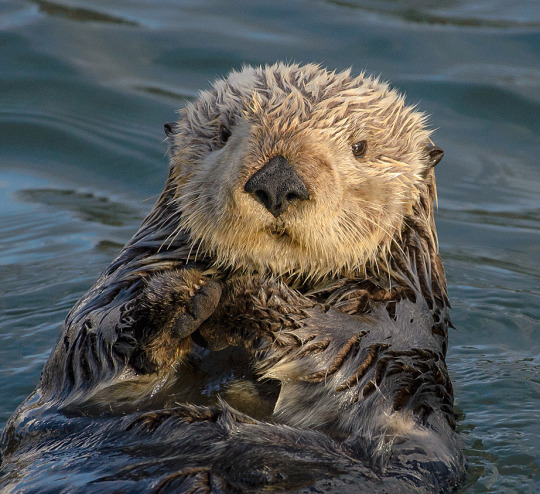
Sea otter
“A close-up of a sea otter, taken in Morro Bay, California in 2016.” - via Wikimedia Commons
#sea otter#enhydra kurtis#wikipedia#wikipedia pictures#wikimedia commons#nature#animals#marine animals#marine mammals#weasel family#carnivora#carnivores#mustelidae#mustelid#lutrinae#enhydra#otters#ocean animals#sea animals#marine life#marine biology#marine biodiversity#oceancore#morro bay#california#california coast#united states#north america
95 notes
·
View notes
Text
Mahi mahi, Dolphinfish, Dorado & Lampuga, all names for the Coryphaena hippurus! These colourful fish are found in the Mediterranean Sea at this time of year (August-November), often aggregating underneath objects floating on the surface.
They live for up to five years, and can get to a meter in length!
By Save the Med Foundation.
In Catalan they're called llampuga, llampec or daurat.
#natura#dolphinfish#mahi mahi#dorado#lampuga#fish#wildlife#underwaterlife#marine biology#marine biodiversity#animals#sea#ocean#sea animals#animal video#fish video#animal videos#zoology
688 notes
·
View notes
Photo

A green sea turtle glides effortlessly above the coral, surrounded by a shimmering curtain of fish. It's a peaceful underwater dance full of grace and serenity.
#green sea turtle#underwater#marine life#coral reef#ocean#sea creatures#nature#wildlife#turtle#serenity#graceful#fish#aquatic#ocean photography#marine biodiversity
108 notes
·
View notes
Text
'Living Breakwater' Makes Room for Oysters and Tidal Pools In Award Winning Design off Staten Island https://www.goodnewsnetwork.org/living-breakwater-makes-room-for-oysters-and-tidal-pools-in-award-winning-design-off-staten-island/
#good news#science#nature#environmentalism#environment#animals#conservation#oysters#breakwater#marine biodiversity#marine animals#sea life#ocean conservation#ocean life
283 notes
·
View notes
Text
The Summer Games are here! No one has ever witnessed the battle displayed in the Museum’s Sperm Whale and Giant Squid Diorama IRL... Choose your fighter! 🦑🥊🐋
#amnh#museum#nature#natural history#animals#fact of the day#did you know#sperm whale#giant squid#deep sea#deep ocean#natural history museum#animal facts#cool animals#whales#squid#marine biology#marine life#biodiversity
419 notes
·
View notes